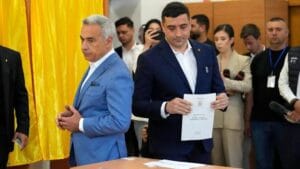Moldova: President exposes massive fraud amid EU Vote
Moldovan President Maia Sandu has issued a stern condemnation following the country’s contentious EU membership referendum, accusing criminal groups of launching an “unprecedented assault” on Moldova’s democratic process.

Moldovan President Maia Sandu has issued a stern condemnation following the country’s contentious EU membership referendum, accusing criminal groups of launching an “unprecedented assault” on Moldova’s democratic process.
In a post on X, Sandu claimed these groups, allegedly backed by foreign actors hostile to Moldova’s national interests, sought to manipulate the referendum through fraud and propaganda.
“These groups attacked our country with tens of millions of euros, lies, and propaganda, using the most disgraceful means to keep our nation trapped in uncertainty and instability,” Sandu declared, highlighting the alleged purchase of 300,000 votes as part of a massive fraudulent effort. She described the scale of the operation as “unprecedented.”
The referendum, which narrowly passed with 50.38% of the vote according to the Central Electoral Commission, aimed to amend the constitution to solidify Moldova’s path toward European Union membership. Moldova applied for EU membership in 2022, and by mid-2024, the European Commission confirmed that Moldova had met the criteria to begin formal accession negotiations. Despite these strides, the referendum’s aftermath has been marred by accusations of external interference.
In the same vote, the first round of the presidential election saw Sandu, a staunch advocate for EU membership, secure 42.45% of the vote, putting her in the lead. Reflecting on the close results, Sandu asserted, “We fought in an unfair fight—and we won.” Her remarks underscore the challenges Moldova faces in securing its democratic institutions amid external pressures.
European Commission President Ursula von der Leyen voiced her support for Moldova, stating on X, “In the face of Russia’s hybrid tactics, Moldova shows that it is independent, it is strong and it wants a European future!” This follows earlier accusations from Canada, the UK, and the US, which charged Russia with attempting to interfere in Moldova’s elections, pledging support to the country in resisting foreign meddling.
The US has already imposed sanctions on Russian state media outlet RT, accusing it of covert influence operations aimed at disrupting elections worldwide, including Moldova’s.
As Moldova grapples with internal and external forces pulling at its democratic fabric, the narrow victory in the EU referendum signifies both the country’s resilience and the mounting challenges it faces on its path to European integration.










